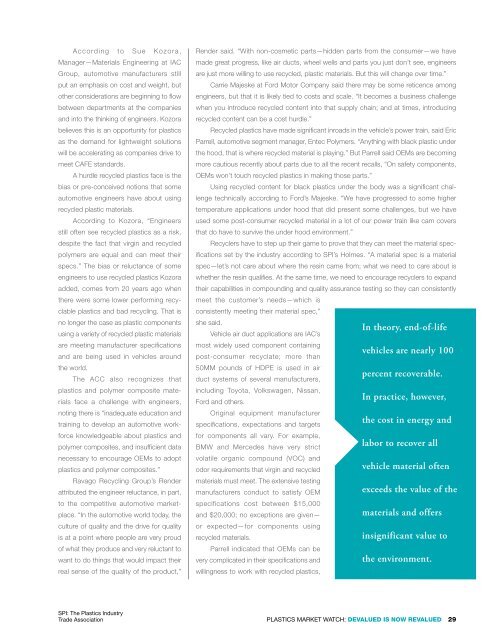Recycling Devalued is now Revalued
1SPybsx
1SPybsx
You also want an ePaper? Increase the reach of your titles
YUMPU automatically turns print PDFs into web optimized ePapers that Google loves.
According to Sue Kozora,<br />
Manager—Materials Engineering at IAC<br />
Group, automotive manufacturers still<br />
put an emphas<strong>is</strong> on cost and weight, but<br />
other considerations are beginning to flow<br />
between departments at the companies<br />
and into the thinking of engineers. Kozora<br />
believes th<strong>is</strong> <strong>is</strong> an opportunity for plastics<br />
as the demand for lightweight solutions<br />
will be accelerating as companies drive to<br />
meet CAFE standards.<br />
A hurdle recycled plastics face <strong>is</strong> the<br />
bias or pre-conceived notions that some<br />
automotive engineers have about using<br />
recycled plastic materials.<br />
According to Kozora, “Engineers<br />
still often see recycled plastics as a r<strong>is</strong>k,<br />
despite the fact that virgin and recycled<br />
polymers are equal and can meet their<br />
specs.” The bias or reluctance of some<br />
engineers to use recycled plastics Kozora<br />
added, comes from 20 years ago when<br />
there were some lower performing recyclable<br />
plastics and bad recycling. That <strong>is</strong><br />
no longer the case as plastic components<br />
using a variety of recycled plastic materials<br />
are meeting manufacturer specifications<br />
and are being used in vehicles around<br />
the world.<br />
The ACC also recognizes that<br />
plastics and polymer composite materials<br />
face a challenge with engineers,<br />
noting there <strong>is</strong> “inadequate education and<br />
training to develop an automotive workforce<br />
k<strong>now</strong>ledgeable about plastics and<br />
polymer composites, and insufficient data<br />
necessary to encourage OEMs to adopt<br />
plastics and polymer composites.”<br />
Ravago <strong>Recycling</strong> Group’s Render<br />
attributed the engineer reluctance, in part,<br />
to the competitive automotive marketplace.<br />
“In the automotive world today, the<br />
culture of quality and the drive for quality<br />
<strong>is</strong> at a point where people are very proud<br />
of what they produce and very reluctant to<br />
want to do things that would impact their<br />
real sense of the quality of the product,”<br />
Render said. “With non-cosmetic parts—hidden parts from the consumer—we have<br />
made great progress, like air ducts, wheel wells and parts you just don’t see, engineers<br />
are just more willing to use recycled, plastic materials. But th<strong>is</strong> will change over time.”<br />
Carrie Majeske at Ford Motor Company said there may be some reticence among<br />
engineers, but that it <strong>is</strong> likely tied to costs and scale. “It becomes a business challenge<br />
when you introduce recycled content into that supply chain; and at times, introducing<br />
recycled content can be a cost hurdle.”<br />
Recycled plastics have made significant inroads in the vehicle’s power train, said Eric<br />
Parrell, automotive segment manager, Entec Polymers. “Anything with black plastic under<br />
the hood, that <strong>is</strong> where recycled material <strong>is</strong> playing.” But Parrell said OEMs are becoming<br />
more cautious recently about parts due to all the recent recalls, “On safety components,<br />
OEMs won’t touch recycled plastics in making those parts.”<br />
Using recycled content for black plastics under the body was a significant challenge<br />
technically according to Ford’s Majeske. “We have progressed to some higher<br />
temperature applications under hood that did present some challenges, but we have<br />
used some post-consumer recycled material in a lot of our power train like cam covers<br />
that do have to survive the under hood environment.”<br />
Recyclers have to step up their game to prove that they can meet the material specifications<br />
set by the industry according to SPI’s Holmes. “A material spec <strong>is</strong> a material<br />
spec—let’s not care about where the resin came from; what we need to care about <strong>is</strong><br />
whether the resin qualifies. At the same time, we need to encourage recyclers to expand<br />
their capabilities in compounding and quality assurance testing so they can cons<strong>is</strong>tently<br />
meet the customer’s needs—which <strong>is</strong><br />
cons<strong>is</strong>tently meeting their material spec,”<br />
she said.<br />
Vehicle air duct applications are IAC’s<br />
most widely used component containing<br />
post-consumer recyclate; more than<br />
50MM pounds of HDPE <strong>is</strong> used in air<br />
duct systems of several manufacturers,<br />
including Toyota, Volkswagen, N<strong>is</strong>san,<br />
Ford and others.<br />
Original equipment manufacturer<br />
specifications, expectations and targets<br />
for components all vary. For example,<br />
BMW and Mercedes have very strict<br />
volatile organic compound (VOC) and<br />
odor requirements that virgin and recycled<br />
materials must meet. The extensive testing<br />
manufacturers conduct to sat<strong>is</strong>fy OEM<br />
specifications cost between $15,000<br />
and $20,000; no exceptions are given—<br />
or expected—for components using<br />
recycled materials.<br />
Parrell indicated that OEMs can be<br />
very complicated in their specifications and<br />
willingness to work with recycled plastics,<br />
In theory, end-of-life<br />
vehicles are nearly 100<br />
percent recoverable.<br />
In practice, however,<br />
the cost in energy and<br />
labor to recover all<br />
vehicle material often<br />
exceeds the value of the<br />
materials and offers<br />
insignificant value to<br />
the environment.<br />
SPI: The Plastics Industry<br />
Trade Association<br />
PLASTICS MARKET WATCH: DEVALUED IS NOW REVALUED 29


